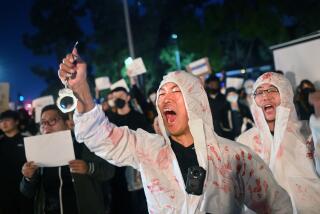Capitalism Wraps Long Arm Around Mao’s Hometown
- Share via
SHAOSHAN, China — You expect hero worship. You expect dogma and doctrine and patriotism-streaked pleas for the workers of the world to unite. You even expect emotion. But not this.
Cigarette dangling, a man sits on a stool outside Mao Tse-tung’s childhood home. Kneeling on the rutted asphalt, a teenage boy silently buffs the man’s shoes to a shiny cordovan.
In the parking lot of the house-turned-museum, this much is clear: The class struggle launched by the most famous revolutionary that Hunan Province ever produced has ended up in a place that the chairman could never have envisioned.
China’s adolescent capitalism -- its “socialist market economy” -- has reached the rural heartland. But unlike the bursts of garish acquisitiveness in the cities, here it takes a more subtle form.
Aside from the national park-like tourist attractions -- Mao’s 1893 birthplace and, up the road, a three-story statue and a museum of his life and times -- Shaoshan seems a standard Chinese small town. That doesn’t mean that it’s gray and communist, though: Even as the Chinese make an icon out of Mao, they are racing to leave behind most of what he instructed them to do.
You could exhaust your last breath walking around Shaoshan and noting the everyday ironies that mock the man who denounced the profit motive and sang “The East Is Red.” Look at the billboard of scarlet sky and golden sunrise -- an ad for “East Is Red” cigarettes, urging people to smoke their way to prosperity.
On another billboard, basketball star Yao Ming talks into a cellphone. An ad for Unforgettable Menswear depicts a Chinese businessman toasting his white counterpart with -- horrors! -- chardonnay. Motorbike stores sell shiny Hondas -- a product of Japan, still denounced regularly as China’s imperialist invader. And at ground zero of a man who considered restaurants a tool of the bourgeoisie, a prominent corner features the Oriental Karaoke Hall.
“The country has changed,” said Zhou Bo, a man in his mid-20s from just up the road. “But Mao, he’s still in people’s minds.”
So they come. Even on a chill winter morning, more than 200 people meander around the patch of lush land that holds Mao’s surprisingly spacious boyhood home.
Near the front gate, in a miniature strip mall, a passel of “Mao Family Restaurants” serve up the chairman’s favorite, fatty pork. Touts dart into the street, madly flagging down cars and yelling the joys of their braised meat in staccato Hunanese.
In one room of Mao’s house, where young Tse-tung helped hull the family’s rice, a snapshot-taker is interdicted by a uniformed member of the People’s Armed Police. “No pictures,” the officer says. “You might sell them.” Visitors can, of course, buy all they want at makeshift souvenir stands that sell golden Mao busts, Mao stamps and cheap Mao lighters that play the real “East Is Red.”
A quarter of a mile away, the museum exhibit is open all day -- and, sundry signs say, sponsored by Zhengtai Electricians. Outside, at the base of the three-story Mao statue, supplicants lay fresh, funereal bouquets and, in some cases, bow heads in prayer.
Twenty million Chinese visited last year, attracted by a recent $1-million renovation. The exhibit is well-curated and hagiographic, sweetened with movies and artifacts gathered since the mid-1960s, when Mao was still in power. (He died in office in 1976, at age 83.)
As befits the headquarters of a personality cult, though, the Maomorabilia not only glosses over the uglier portions of his reign but veers into the unsettlingly personal.
A ratty easy chair that Archie Bunker would have rejected? Mao sat in it during his historic 1972 meeting with President Nixon. Nearby are Mao’s chopsticks, shaving kit, comb, socks and sandals, record player, pingpong paddles and net. There’s even -- Mao help us -- the chairman’s outsized burgundy swim trunks.
At the inevitable souvenir shop, Tang Jin, born five years after Mao died, talks of those who visit.
“The old soldiers come, they go to the statue outside and they weep. They say, ‘You founded our country,’ ” Tang said. “Younger ones who grew up learning about him on the Internet, they want to see what all the fuss is about. The country has changed, but he’s still thought of as the father.”
What, then, hath Mao wrought? His vision has turned into a China Inc. of Converse and Sony electronics where the NBA will play this year, where the revolution -- what’s left of it -- will be televised and marketed and probably simulcast on the Web for an eager and emerging middle class.
A museum visitor offers a carmine 100-yuan note depicting Mao’s face. Change is given: a 50-yuan note, a 20-yuan note and a 5-yuan note. On each, the same face stares out: the founder of the people’s republic, the revolutionary who warned of disaster if ever his people tried to make money.
In China today, though, Mao is money, and money is Mao. In a country venturing into uncharted territory without the sky falling, few seem to see any contradiction.
More to Read
Sign up for The Wild
We’ll help you find the best places to hike, bike and run, as well as the perfect silent spots for meditation and yoga.
You may occasionally receive promotional content from the Los Angeles Times.






